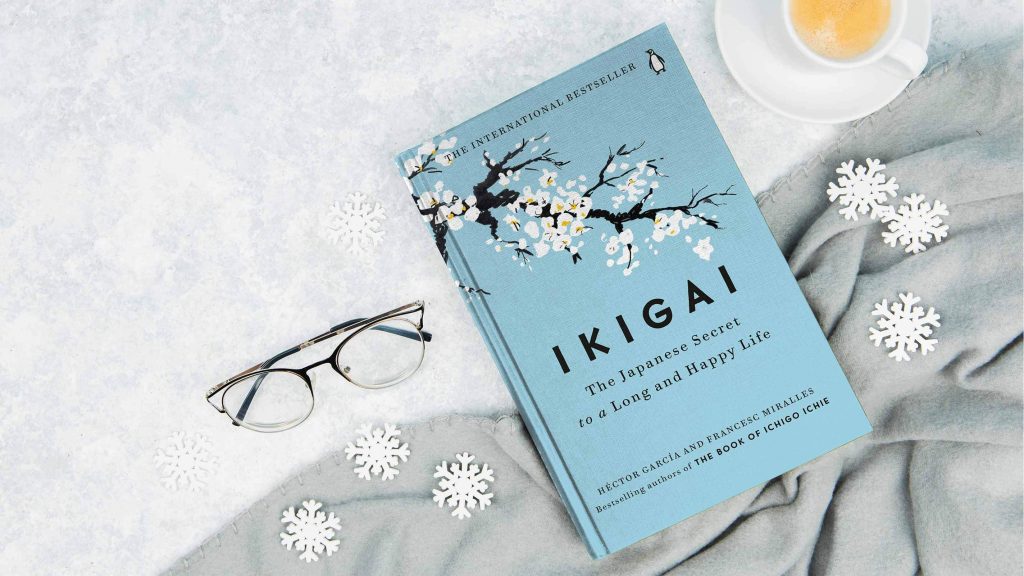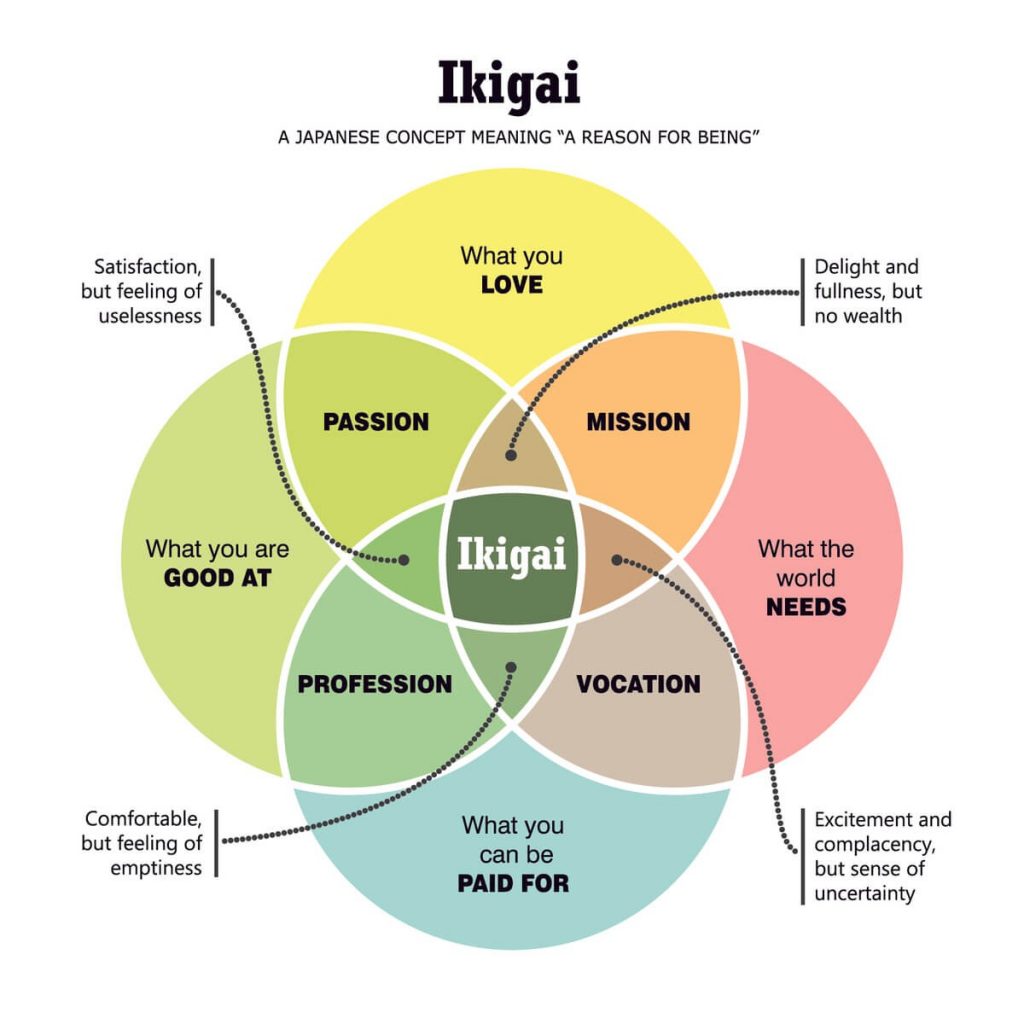
It is only a matter of time that an existential crisis strikes you. You may have already had one. We wake up every day trying to understand our purpose and ways to live a happy and fuller life, only to get back to the grind and continue this cycle without any honest answer.
Ikigai, an excellent little book written by Hector Garcia and Francesc Miralles, leads by example on how the people of Okinawa-Japan, stay happy, physically fit and live way longer than the rest of the world. The book has numerous lessons to make our lives cheerful and adventurous yet calm.
Here are some of these lessons:
Find Your Ikigai
“Everything can be taken from a man but one thing: the last of human freedoms—to choose one’s attitude in any given set of circumstances, to choose one’s own way.”
Simply put, ‘Ikigai’ puts into perspective the ‘why’ to your daily life. This is your existential fuel; the reason for getting up in the morning. Human beings need a reason for living; someone or something in their lives that fulfils their sense of purpose. To find your Ikigai, ask yourself these four questions:
- What do I love?
- What am I good at?
- What does the world need from me?
- What can I get paid for?

Never Retire
Realistically, you never retire; your activities simply shift focus. You have to think creatively on ways to utilize your accumulated knowledge, experience and relationships to create value. In the Okinawan language, the word ‘retirement’ doesn’t exist.
Live an intentional and purposeful life. Keep learning, changing, growing, contributing and never retire.
A healthy body is the product of a healthy mind
“A healthy mind remains in a healthy body” is the common adage. But, the reverse is also true– a healthy body is the product of a healthy mind. I have seen people in their 80s and 90s, who can give a run to people in their 40s and 50s. If you keep your mind engaged productively, you will enjoy a healthy body. I believe the formula for antiaging is to keep your mind young through constant learning, gaming, stressing less, and interacting with people.
Handle negative emotions positively
Like the weather, we cannot predict or control our emotions; we can only observe them. Sometimes, negative thoughts cloud our mind. To handle them, you need to replace your negative thoughts with positive ones.
Learn to avoid, ignore or not entertain your negative thoughts. Stick to your Ikigai, keep taking the right actions and that is the way to face the storm of negative emotions. Always believe that ‘The world is full of opportunities for growth and achievement’.
Live and enjoy the moment
“There is no future and no past: it’s only the present that matters”
When you are in the present moment, fully absorbed in the activity at hand, there is no past and no future; you are in the state of flow. This entails a very high level of focus, a meditative experience. This moment exists only now and won’t come again. Therefore, live the present moment fully without worries about the past or the future. To experience the flow, you have to avoid multitasking.
Once the journey begins, you have to focus on execution without being distracted by your own objective. The authors in this book state “Don’t worry about the outcome–it will come naturally. Happiness is in doing, not in the results. The happiest people are not the ones who achieved the most; they are the ones who spend more time than others in a state of flow.” Never forget to express your gratitude for what you have right now. Indeed, gratitude has consistently been associated with positive outcomes.
Live an unhurried life
“To go faster, one has to go slower.”
Happy people are passionate about everything they do, even the insignificant tasks. They have an Ikigai, but they take breaks, too. They are relaxed, have fun and enjoy all that they do. They celebrate all the time, even the little joys in life. Also, music and dance are essential parts of their daily life.
Technology has helped us save time, but this free time is often filled with other tasks. Modern society seems to be busy and faster than ever before. It doesn’t have to be this way. A slow-paced life means making time to enjoy the little things, spending time with family and friends, and celebrating the smallest of accomplishments while on the road to accomplish your goals.
Eating right with exercise is the way to happiness
According to the book, more fruits and vegetables, dry fruits, less sugar and salt, olive oil, red wine in moderation and stopping at 80% of your hunger is the key to good health. Let’s face it, good eating habits like such have been professed for years, and it has further proven to be the way to a good life. Walking and moderate exercise have to be an essential part of your everyday life.
Surround Yourself With Good Friends
One of the secrets of long life is smiling and having a good time. This cheerful attitude is not only relaxing; it also helps you make new friends. Research shows that friends can affect your health even more than family. Find a group of friends that help you grow and spend time with them as much as you can. Simply calling or meeting to check up on each other, sharing experiences, and living life can go a long way in boosting a life filled with happiness.
Build Resilience
‘You are never too old to set another goal or to dream a new dream.’ – C. S. Lewis
Resilience is our ability to deal with setbacks. Resilient people know how to stay focused on objectives in every circumstance, and their source of strength is to adapt to change. Face life’s challenges with confidence and without stress. The authors state, “While everything is fleeting if you have a clear sense of your Ikigai, each moment will hold so many possibilities that it will seem almost like an eternity.”
The Key To Longevity
“He who has a why to live can bear almost any how.”
To conclude, eating light, moderate regular exercise, enough rest, finding a purpose in life (your Ikigai), and forming strong social ties are key to lead a long and happy life. Celebration of every small act is another aspect of a happy life. Remember, humanity is in pursuit of happiness and, happiness lies in purposeful actions.
Other referred resources in this book:
Man’s search for meaning
Maximum Brainpower – Challenging the brain for health and wisdom
Flow – The Psychology of Optimal Experience
Whiplash: How to survive our fast future
Antifragile by Nassim Nicholas Taleb